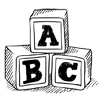Introduction: Executive function skills are crucial cognitive abilities that enable children to plan, organize, and execute tasks effectively. Wooden blocks play a significant role in developing these executive function skills by providing opportunities for structured and creative play. In this blog, we’ll explore how wooden blocks contribute to the development of executive function skills in children and lay the groundwork for their academic and life success.
- Planning and Organization: When children build with wooden blocks, they plan and organize their designs, considering the placement and order of each block, enhancing their executive function skills.
- Working Memory: Wooden block play requires children to hold and manipulate mental representations of their designs, which strengthens their working memory and cognitive flexibility.
- Focus and Attention: As children engage in building complex structures with wooden blocks, they develop sustained focus and attention, critical for completing tasks and staying on track.
- Self-Regulation: Wooden block play encourages children to manage frustration and setbacks, promoting self-regulation and emotional control during problem-solving challenges.
- Task Persistence: Completing intricate block structures requires perseverance and task persistence, helping children develop resilience and a growth mindset.
Conclusion: Wooden blocks serve as valuable tools for developing executive function skills in children. By fostering planning and organization, working memory, focus and attention, self-regulation, and task persistence, these toys empower children with essential cognitive abilities that will serve them well in academic pursuits and beyond. As children engage in creative and constructive play with wooden blocks, they build the foundation for future success in various aspects of life.








